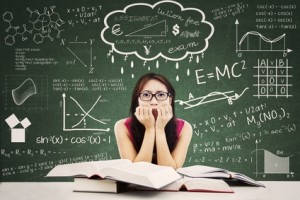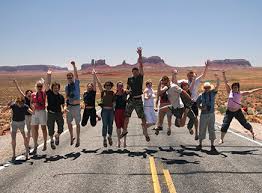
Science has always been a fascinating subject for me, but one that was beyond my reach in my formal schooling. Growing up, we moved frequently. I attended 10 schools over my 12 years, bouncing between two provinces with different curriculums. While I excelled at reading and at anything using my creativity, the repeated moves did not provide continuity or stability for my math education. I did not acquire basic math fluency or number sense. My educational challenges with math growing up always impeded my ability to engage with the sciences. While I found them fascinating, without the basic number sense that I failed to grasp in elementary school the sciences were beyond my reach in high school. I managed to graduate with the minimum requirements for both science (biology 10- the least math based science course) and a 'P' in math- achieved only through a summer school class.
I pursued a degree in social work and worked in the social work field for many years. My degree focused on psychology and counselling, along with advocacy and public policy. Science and Math were not part of my everyday world for many years.
My first positive experience with both science and math was the opportunity to take an introductory astronomy class as an elective for my degree- Elementary Astronomy for Non-science students at UVIC. My professor had crazy mad professor hair and was quirky to say the least. He took a lecture hall full of math phobic Arts degree students and Star Trek fans and toured us through the wonders of the universe, teaching us some basic physics along the way. I also had the support of my husband at the time who was comfortable with math and was able to tutor me with the basic formulas and calculations required. This year long course was the first time that I felt successful with either a science or a math subject and changed my attitude towards these topics from reluctance and failure to excitement and success.
My career path eventually lead me into show business, and I was a full time circus artist for 6 years before beginning to age out of the industry and so took the PBED program. My experience with prop manipulation was purely movement based; it was only in the past 3 years since working with a new performance partner (a math and science major) that I've been learning the math behind the movement. I've even been exploring the math of patterns and movement in my Math Blogs over the past semester. (http://www.vestaeducation.com/viu-education-program/category/mathematics)
My science project was an exciting prospect for me- starting to explore the physics of movement as it relates to circus. This was not simply writing lesson plans about concepts I was already familiar with. This was learning completely new-to-me concepts and adapting lesson plans to include circus based examples and activities. I compiled 9 lesson plans that explain the concepts that apply to circus movement. They are geared for approximately grade 6 level.
The grade 6 curriculum focuses on the laws of motion, and I have taken some liberty to include other topics in surrounding grades such as sound waves. Thankfully, the elementary curricula is focused on learning the concepts and not the math. My lesson plans do not include the math of physics.
I can easily ground my decision to exclude the math in developmental theory. Piaget states that children in grade 6 will not have the capacity to learn symbolic mathematics as they are still in the Concrete Operational stage of thinking. My own experience with high school math and science could be viewed in this lens as well- perhaps my own development was typical in that even without the fundamentals, I was not developmentally ready for the abstract maths when they were presented to me.
Reflection of my motivations shows that I have other more personal reasons for not including math. One, it is not explicitly stated in the curricula that it needs to be included. My underlying motivation is that simply I am still uncomfortable with the subject. However this leaves me with a nagging feeling that the lessons are incomplete. I am
torn between my desire to present a complete lesson and my fear of my own inability to not only understand but to explain the concepts.
This is not an isolated struggle. When we take on the role of 'teacher', we can be tempted to proclaim ourselves as 'experts' on the topics we are teaching.
As generalist practitioners however, we present the entire academic spectrum to the elementary classes. This project crystallizes a struggle that I feel we all have- how to present material to a class that we are unsure of. How do we teach what we do not know?
The answer, of course, is we learn along with our students, and remember that the children we work with may not be ready to learn everything that we have capacity to teach. This project has only introduced me to the laws of motion, and every time I teach this topic my understanding will deepen. I do not have to know everything, and while I will be able to learn more with each experience, I need to remain child centered in my approach. Teachers can take the position of co-learner instead of expert. Like my astronomy teacher from years ago, I can accompany my students on a journey of discovery. I don't need to know all the answers, I just need to model wonder and curiosity about the world around us. We can travel together.
I pursued a degree in social work and worked in the social work field for many years. My degree focused on psychology and counselling, along with advocacy and public policy. Science and Math were not part of my everyday world for many years.
My first positive experience with both science and math was the opportunity to take an introductory astronomy class as an elective for my degree- Elementary Astronomy for Non-science students at UVIC. My professor had crazy mad professor hair and was quirky to say the least. He took a lecture hall full of math phobic Arts degree students and Star Trek fans and toured us through the wonders of the universe, teaching us some basic physics along the way. I also had the support of my husband at the time who was comfortable with math and was able to tutor me with the basic formulas and calculations required. This year long course was the first time that I felt successful with either a science or a math subject and changed my attitude towards these topics from reluctance and failure to excitement and success.
My career path eventually lead me into show business, and I was a full time circus artist for 6 years before beginning to age out of the industry and so took the PBED program. My experience with prop manipulation was purely movement based; it was only in the past 3 years since working with a new performance partner (a math and science major) that I've been learning the math behind the movement. I've even been exploring the math of patterns and movement in my Math Blogs over the past semester. (http://www.vestaeducation.com/viu-education-program/category/mathematics)
My science project was an exciting prospect for me- starting to explore the physics of movement as it relates to circus. This was not simply writing lesson plans about concepts I was already familiar with. This was learning completely new-to-me concepts and adapting lesson plans to include circus based examples and activities. I compiled 9 lesson plans that explain the concepts that apply to circus movement. They are geared for approximately grade 6 level.
The grade 6 curriculum focuses on the laws of motion, and I have taken some liberty to include other topics in surrounding grades such as sound waves. Thankfully, the elementary curricula is focused on learning the concepts and not the math. My lesson plans do not include the math of physics.
I can easily ground my decision to exclude the math in developmental theory. Piaget states that children in grade 6 will not have the capacity to learn symbolic mathematics as they are still in the Concrete Operational stage of thinking. My own experience with high school math and science could be viewed in this lens as well- perhaps my own development was typical in that even without the fundamentals, I was not developmentally ready for the abstract maths when they were presented to me.
Reflection of my motivations shows that I have other more personal reasons for not including math. One, it is not explicitly stated in the curricula that it needs to be included. My underlying motivation is that simply I am still uncomfortable with the subject. However this leaves me with a nagging feeling that the lessons are incomplete. I am
torn between my desire to present a complete lesson and my fear of my own inability to not only understand but to explain the concepts.
This is not an isolated struggle. When we take on the role of 'teacher', we can be tempted to proclaim ourselves as 'experts' on the topics we are teaching.
As generalist practitioners however, we present the entire academic spectrum to the elementary classes. This project crystallizes a struggle that I feel we all have- how to present material to a class that we are unsure of. How do we teach what we do not know?
The answer, of course, is we learn along with our students, and remember that the children we work with may not be ready to learn everything that we have capacity to teach. This project has only introduced me to the laws of motion, and every time I teach this topic my understanding will deepen. I do not have to know everything, and while I will be able to learn more with each experience, I need to remain child centered in my approach. Teachers can take the position of co-learner instead of expert. Like my astronomy teacher from years ago, I can accompany my students on a journey of discovery. I don't need to know all the answers, I just need to model wonder and curiosity about the world around us. We can travel together.

 RSS Feed
RSS Feed
